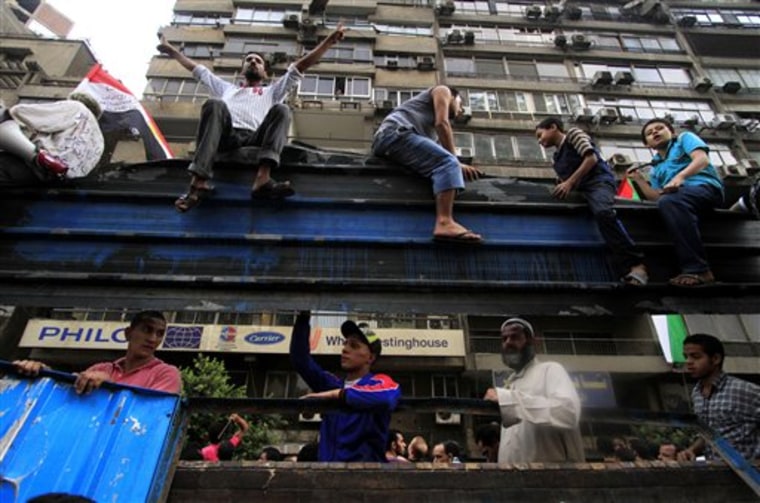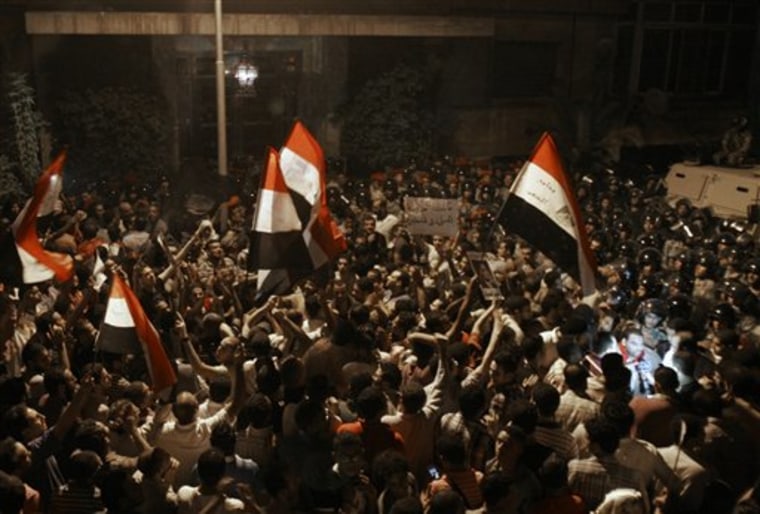A barrage of Palestinian rockets from Gaza slammed into southern Israel on Saturday, medical officials said, killing an Israeli man and injuring about a dozen people in the latest flareup of violence between two longtime enemies.
Israel's rescue service said one person was killed in the desert city of Beersheba. Three people were seriously hurt when a Palestinian rocket hit a house and a car in the same city. Two children and a 4-month-old baby were injured by rocket shrapnel that hit a house in nearby Ofakim.
Some rockets were intercepted by the new Israeli anti-missile system known as Iron Dome.
Israel carried out multiple airstrikes on targets in Gaza over the weekend, killing at least seven militants. Violence began when attackers from Gaza ambushed vehicles in southern Israel on Thursday, killing eight people.
Israel also said Saturday it "regrets" the deaths of three Egyptian soldiers during a cross-border clash with Palestinian militants, hours after Cairo threatened to withdraw its ambassador.
Israel has blamed Palestinians from Gaza who came through Egypt's Sinai desert for killing eight Israelis after they crossed the border. The violence is testing Israel's landmark 1979 peace treaty with Egypt, already strained by the fall of longtime autocratic leader Hosni Mubarak.
"Israel deeply regrets the deaths of the Egyptian officers," Israeli Defense Minister Ehud Barak said.
The statement came after Egypt threatened to recall its ambassador to protest the killings of its soldiers. The Egyptian government put an announcement on its website overnight saying it had pulled the envoy, but later backtracked and said it was only considering the move.
On Thursday, the militants who crossed from Egypt launched a series of attacks on cars and buses in Israel's south. Egypt says that the three soldiers were killed in an Israeli air strike along the Israel-Sinai border in response to the attacks. Israel said there was an exchange of fire between its soldiers and "terrorists" on the Egyptian border following the deadly attacks.
Egypt's interim government accused Israel of violating the peace treaty by killing the soldiers and demanded an apology.
A cold peaceThe deadly attacks and Israel's response have strained what was always a cold peace between the neighboring states. Egypt became the first Arab nation to make peace with Israel in 1979. And Israel valued Mubarak as a source of stability with shared interests in containing Iran and its radical Islamic proxies in the region — including the Hamas militants who run Gaza.
The agreement called for Israel to return the captured Sinai to Egypt. In return, Egypt agreed to certain restrictions on the number of troops placed in Sinai.

Several Egyptian political parties issued statements condemning the Israeli raid and calling for changes to the peace treaty, which regulates the number of Egyptian troops allowed in the Sinai Peninsula.
"This crime should be dealt with in an appropriate way," said the Muslim Brotherhood, Egypt's best-organized political force. "What was possible before the revolution will not be allowed to continue after the revolution."
Israeli officials insisted the peace treaty was "stable" despite the troubling developments.
"No one had any intention to harm Egyptian security personnel," Amos Gilad, a senior Israeli Defense Ministry official who works closely with Egypt, told Israel Radio.
The cross-border attack has raised concerns about the increasingly lawless northern Sinai, where porous borders with both Israel and the Hamas-ruled Gaza Strip make it an attractive staging ground for Palestinian militant attacks on Israel.
